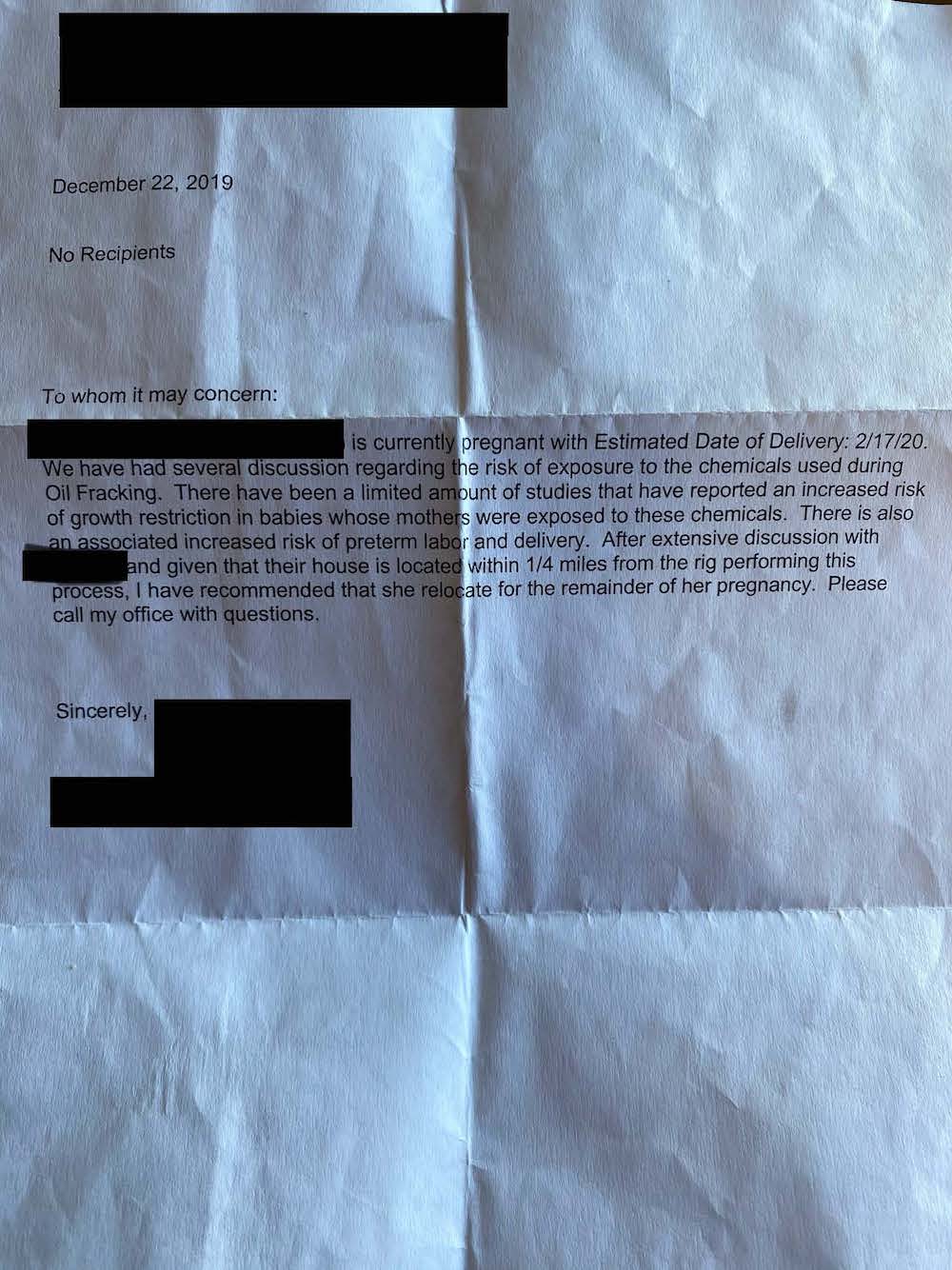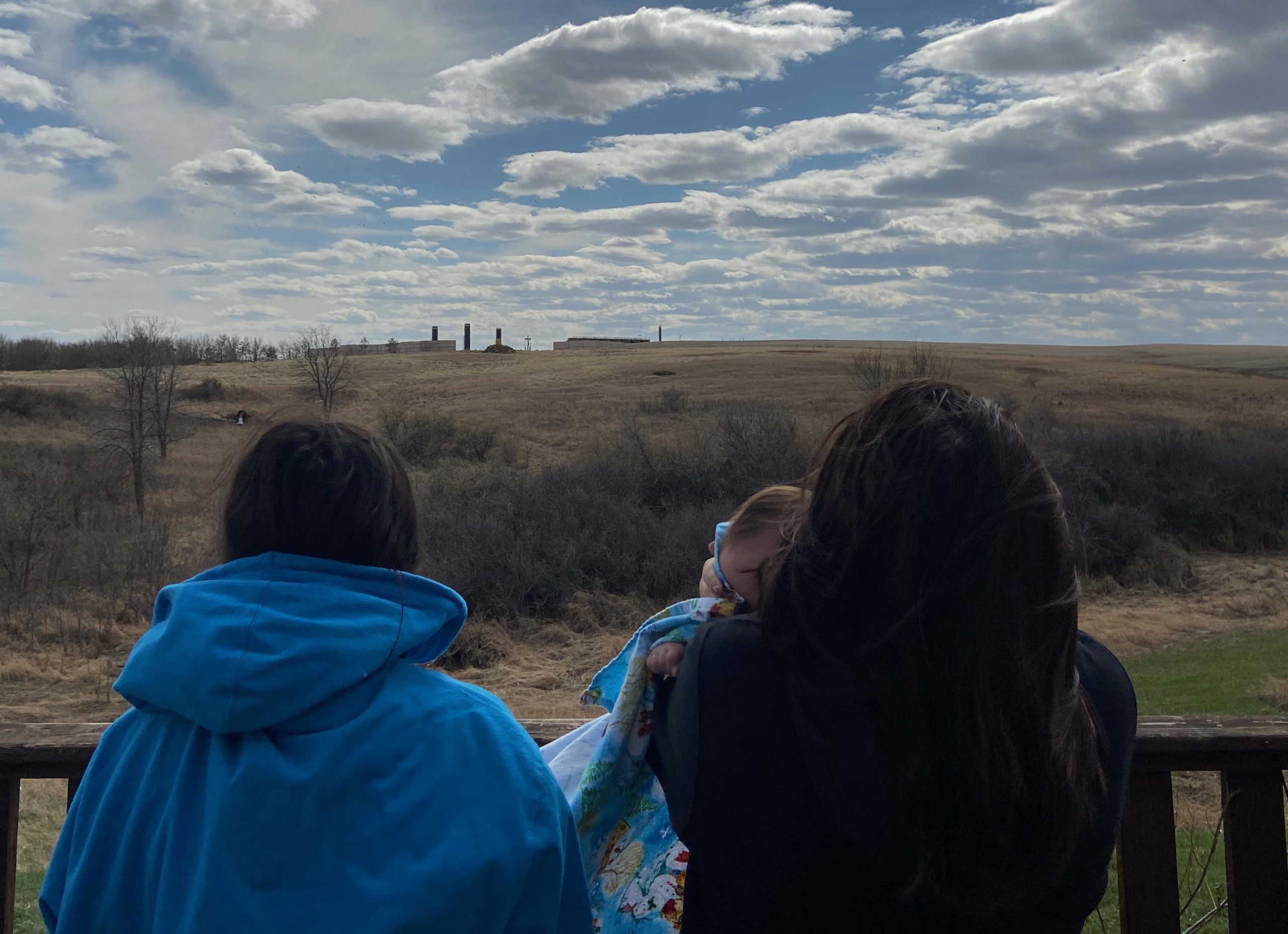On December 22, 2019, James Brugh and his wife Victoria, who was seven months pregnant, received a letter from an Ob-Gyn they had visited in Bismarck, ND. Concerned about Victoria’s exposure to the pollution from nearby oil operations and the potential increase in risk of complications, such as growth restriction and preterm labor and delivery, the doctor wrote:
“After extensive discussion with [Victoria], and given that their house is located within ¼ miles from the rig performing this process, I have recommended that she relocate for the remainder of her pregnancy.”
For Victoria and James, this was the latest in a long line of worrying events regarding their family’s health and safety.
James has been fighting to protect his family’s well-being for over three years. He secured some changes from Marathon Oil, the oil & gas company that operates the nearby oil wells, but they all have fallen far short of alleviating the physical and psychological toll of living next to oil and gas production in North Dakota.
‘Hell on Earth’
James, Victoria, and their two young daughters moved into their home on the Fort Berthold Indian Reservation in 2014. Their house sits on family land next to a Marathon Oil service road, just outside of New Town. Two years after the family moved in, Marathon drilled a well 370 yards from the house. And so began four years of relentlessly disruptive fracking operations.
“Our senses were being overwhelmed daily,” James recalls, describing constant noise, bright light, and ground shaking as “hell on earth.”
As the fracking operations continued, the family’s health began to decline as they experienced problems scientifically linked to oil and gas operations. Their older daughter started to get nosebleeds, while their younger one got intense headaches. James experienced increased anxiety, insomnia, and shortness of breath alongside a decline in his overall physical fitness. All four now suffer nasal congestion and runny noses while at home that often ease up when they are away from the house and the nearby well pad. James has no doubt that these symptoms were caused by exposure to air pollution from the well pad.
A pause on activities at the well pad has given the family a break from some of these disruptions. However, the health impacts have remained, and James is worried about how these conditions might affect his newborn son’s health and development.

Discussing the doctor’s letter, James explained his fears, “[The doctor] was talking about the risks that were posed to Baby in the womb. [Now] Baby’s outside the womb. If he was going to be at risk with all the protection that his mom could give him, he doesn’t have that now. If he was at risk in the womb, how much more [at] risk is he now?”
Contaminated air and chronic stressors aren’t the only Marathon-induced dangers that keep James up at night. For years, Marathon workers driving up and down the service road have frequently trespassed and littered on the family’s property, harassed them, and repeatedly threatened physical violence.
Marathon workers routinely speed on the service road by the house and carry firearms onto the well site, which adds to James’ fear of an explosion. Workers have followed Victoria home and threatened her in her own driveway. In an alarming incident last June, a Marathon employee confronted James with a gun while the family was hosting a birthday party for one of the kids.
After the birthday party incident, Marathon took some moderate steps to address James’ concerns. They discouraged employees from speeding and stopping in front of the house, reduced noise and nighttime lighting, and increased their security presence.
Unfortunately, none of these measures remediated the family’s onerous health problems, and the threatening encounters with workers nevertheless persist. James is exhausted from the effort it took to win just these moderate concessions but remains hopeful that he can find a way to get Marathon to address the family’s remaining concerns.
Before the COVID-19 pandemic, Marathon was scheduled to restart fracking operations at the well pad in May of 2020. Now they’ve told James that the work will be delayed until August at the earliest. Despite the uncertain timeline, James is bracing for a return, whenever it comes.
Families & Communities Deserve Better
In the meantime, the family faces a stark choice – either stay put and continue to endure all the issues facing them, or move somewhere else. At this point, James would prefer to move, but the family lacks the financial resources to do so.

This begs the question: Why should James bear the responsibility and the cost of escaping the harms caused by Marathon Oil? James thinks that Marathon Oil should either help his family move, or stop all flaring near the house, address air quality issues, and ensure that their workers stop threatening his family.
There are families all across the country facing a similarly terrible choice. And James isn’t the only one demanding action. Regulators have a responsibility to safeguard communities from the harm caused by oil & gas operations, and to hold accountable the operators causing the harm. Community voices deserve to be heard–and every family deserves to be safe and healthy in their own home.
Your Support Makes Our Work Possible
Earthworks helps families on the front lines of mining, drilling, and fracking. We use sound science to expose health, environmental, economic, social, and cultural impacts of mining and energy extraction. To support our efforts, please consider a tax-deductible donation today that will go toward our work reforming government policies, improving corporate practices, influencing investment decisions, and encouraging responsible materials sourcing and consumption.
